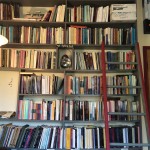Tags
Related Posts
Share This
Tales From The Trenches: Michael Wiegers
When I was a kid, around 8 years old, I would sit at my typewriter (yes, I had a typewriter, this was early dial-up-internet days) and type up a story. Then I would make a pile of these words and edit them, sitting at my desk next to an Aaron Carter poster. I’d pretend I worked in publishing and make notes in a yellow legal pad.
At 9, I sent out one of my “manuscripts” to Scholastic and, miraculously, three weeks later, I heard back. The envelope is still marked “never throw out!” by my mother. Inside, the editor said they regretted that they could not publish my piece, but recommended other editors who worked with children’s novels. The editor said it was impressive that I was so dedicated at such a young age. Her last line was, “I loved the read and hope your career goes well.”
When I was with the New York Arts Program this past fall, many editors came to visit, and many editors interviewed me for possible internships. The process and love of reading never came up and, if it did, it was never with the intention of “finding an audience for a writer” but, rather, marketing a book and making sure it can sell, sell, sell. The publication houses themselves often looked vapid: lots of cubicles, lots of glass displays for the books—books that were off-limits for touching (therefore, books that cease to live off the page.)
For me, after these New York meetings, the life of an editor was chiseled down into a sad, small office, hundreds of manuscripts on a desk, falling over and onto the floor, and not enough time to appreciate them.
 This vision was altered when Michael Wiegers, executive editor at Copper Canyon Press, visited SFUAD on April 2. Copper Canyon Press is an independent press that focuses on the voice of the poet. Some of my favorites include Arthur Sze, Brenda Shaughnessy, C.D. Wright, and SFUAD’s very own Dana Levin.
This vision was altered when Michael Wiegers, executive editor at Copper Canyon Press, visited SFUAD on April 2. Copper Canyon Press is an independent press that focuses on the voice of the poet. Some of my favorites include Arthur Sze, Brenda Shaughnessy, C.D. Wright, and SFUAD’s very own Dana Levin.
The meeting with Wiegers quickly became a presentation on the benefits and importance of reading. Copper Canyon receives 2,000 manuscripts per year, and they’re able to publish about 1 percent. Reading can easily become a chore under such circumstances. However, Wiegers spoke at length and with great passion about the process of the reading. He did not wish to romanticize the process of publication, showing the group of students Excel sheets of data that every editor uses to organize their manuscript pile. But his eyes lit up every time he spoke about reading these said manuscripts, and I felt rejuvenated.
 While publication is inherently a business, and Wiegers agrees on this fact, an overarching theme of his talk showed this does not have to be the life of a publication. The editors don’t have to be shut off to new ideas, walls of books don’t have to be guarded by glass: rather, the innumerable books and manuscripts can have a dialogue with one another, interacting and living within and outside the confines of the independent press.
While publication is inherently a business, and Wiegers agrees on this fact, an overarching theme of his talk showed this does not have to be the life of a publication. The editors don’t have to be shut off to new ideas, walls of books don’t have to be guarded by glass: rather, the innumerable books and manuscripts can have a dialogue with one another, interacting and living within and outside the confines of the independent press.
Wiegers spoke about his office: a wall covered with books by different poets, all of whom add something new to the picture and voice of the press. “I like to imagine all the book and authors are talking to each other. [When I’m picking a new book or author to publish], I think, ‘How is this person going to fit into this wall? What are we missing [in this dialogue]? How can this writer make that interaction more interesting?’ The wall isn’t there to serve my personal interest…I try to serve an imagined reader. There are open spaces on the bookshelf, as you can see, just waiting to be filled.”
 In regards to the imagined reader, Wiegers stands by an old ideal: Every author needs a third reader. As a writer, our first reader is someone close and safe. Our mother, wife, husband, brother. Our second reader would be a colleague, friend, or fellow writer. The third writer, the “unknown beloved out there in the world,” as Wiegers coins, is more elusive. Wiegers says: “I want to be a professional third reader. [The editor is] a filtering system, distilling down the essence which is the book. [I want to] reach books and writers on their terms and tell the world what’s great about them.”
In regards to the imagined reader, Wiegers stands by an old ideal: Every author needs a third reader. As a writer, our first reader is someone close and safe. Our mother, wife, husband, brother. Our second reader would be a colleague, friend, or fellow writer. The third writer, the “unknown beloved out there in the world,” as Wiegers coins, is more elusive. Wiegers says: “I want to be a professional third reader. [The editor is] a filtering system, distilling down the essence which is the book. [I want to] reach books and writers on their terms and tell the world what’s great about them.”
In my time here in Santa Fe, and in New York, I have seen the ugly and the beautiful side to reading. Reading can be something people avoid; the image of a class full of people who haven’t read the assignment or taken the time to edit my work comes to mind. Reading can also be something that sparks thought and excitement, and the idea of someone who doesn’t know the writer personally taking the time to sit and read his or her work has birthed the world of blogs. People want to be heard, and writers want to be heard even more. They want to create and have that creation be molded, shaped, considered. Copper Canyon Press, which Wiegers represents, is a group of like-minded people who love their job, no matter the long hours and the underpaid nature of their profession.
 “I want to privilege the act of reading. Beyond data, beyond navigating pieces and beyond rejection. The submission process can become more about reading and the conversation [from that] reading than the yes/no of the publication process.”
“I want to privilege the act of reading. Beyond data, beyond navigating pieces and beyond rejection. The submission process can become more about reading and the conversation [from that] reading than the yes/no of the publication process.”
As the world of writers changes and Amazon takes over the book-selling world, it’s nice to know that there is still the editor I dreamed about, and heard from, as a child.






 Jackalope Magazine is the student magazine of Santa Fe University of Art and Design. Building on the interdisciplinary nature of our education, we aim to showcase the talent of our university and character of our city.
Jackalope Magazine is the student magazine of Santa Fe University of Art and Design. Building on the interdisciplinary nature of our education, we aim to showcase the talent of our university and character of our city.
Loved this !!